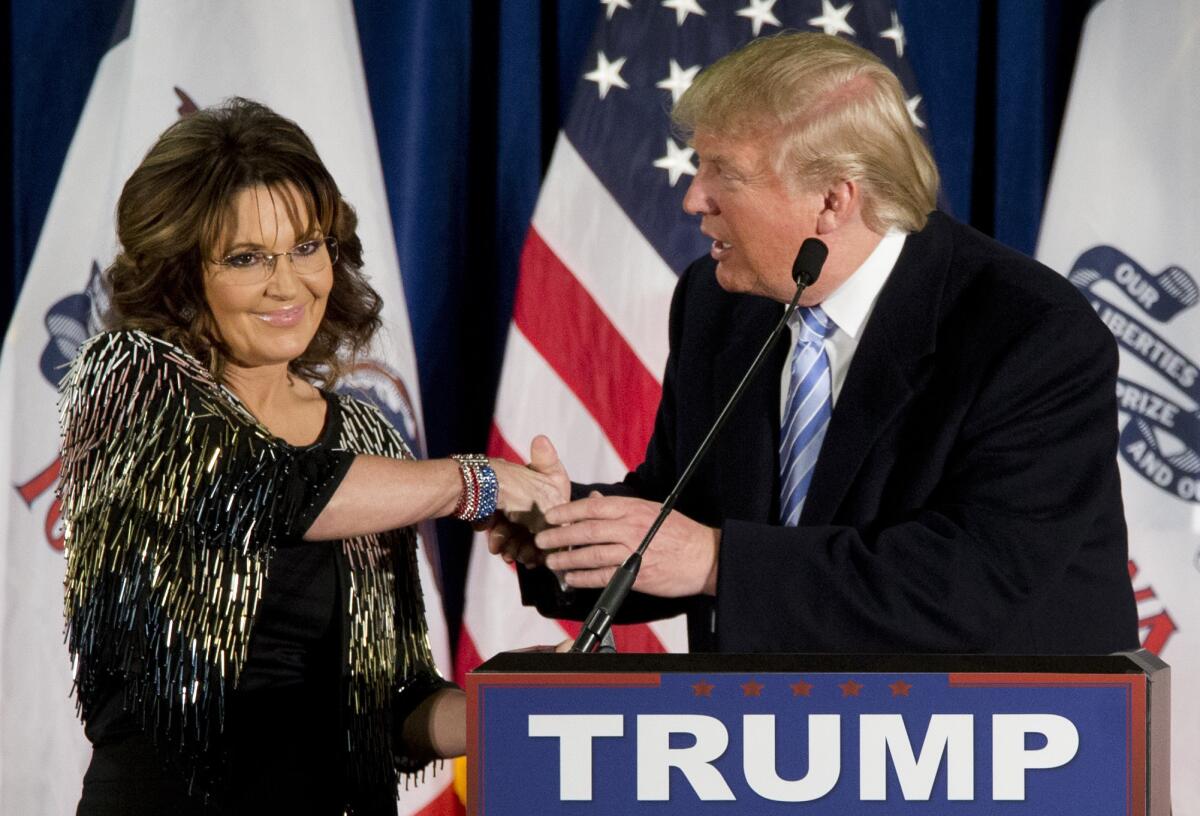Donald Trump’s campaign might break apart the tea party

Former Republican vice presidential candidate and former Alaska Gov. Sarah Palin endorses Republican presidential candidate Donald Trump during a rally at Iowa State University on Tuesday, Jan. 19, 2016, in Ames, Iowa.
- Share via
Reporting from Washington — Always a bit of a rebel, Debbie Dooley was so frustrated in 2009 over bank bailouts and stimulus packages that she threw herself into organizing Atlanta’s first tea party rally.
Today, the daughter of a Southern preacher has shifted her energy and passion into electing Donald Trump as the latest Washington outsider to shake up the status quo.
No matter that many of Trump’s policies stray from the tea party’s original small-government ideals. The tough-talking billionaire ignites that same anti-establishment fervor that fired up many tea party foot soldiers like Dooley.
In the process, Trump has recast their earlier champions — namely tea party darling Sen. Ted Cruz — as disappointing outsiders-turned-insiders who cater to corporate donors and fail to deliver on big promises.
Election 2016 | Live coverage on Trail Guide | March 15 election results | Track the delegate race | Sign up for the newsletter
“The support for Trump is not only a screw-you to the Republican establishment, it’s a screw-you to the conservative establishment,” said Dooley, 57, an energy consultant. “[People] are sick and tired of the same old, same old — just money corrupting the political process. They work hard, they vote for elected officials and they expect them to keep their promises.”
Trump’s candidacy has not only fractured the Republican Party, it’s threatening to break apart the tea party movement and erode a once-powerful voting block that has driven conservative politics and elections for the past seven years.
In addition to grass-root defections by activists like Dooley, tea party leadership has split over Trump’s presidential bid. Some conservative activists met this week to try to stop him, while others have joined his campaign.
Meanwhile, major financial backers, including groups funded by the billionaire Koch brothers, have been sidelined from publicly backing GOP primary candidates, partly out of fear they might alienate their divided base.
The soured relationship should come as no surprise. The tea party was always somewhat of a marriage of convenience between Washington’s free-market powerhouses and frustrated ordinary Americans who showed up at rallies with their tri-cornered hats and “Don’t Tread on Me” flags.
Fighting President Obama provided an easy alliance that Republicans at first leveraged to their advantage. But it also was a relationship built on what now looks like a rickety foundation — less about think-tank-driven policies and more about voter outrage against perceived elitism.
From an ideological standpoint, the tea party’s natural candidate should be Cruz, the Texas senator who was swept into office in the tea party revolt and wears his unpopularity in Washington as an “outsider” badge of honor.
But in Trump’s long shadow, Cruz and rival Sen. Marco Rubio, before he left the campaign, suddenly looked to many rank-and-file activists as part of the problem.
“I don’t see Ted Cruz being a job creator,” Dooley said.
Trump’s positions against free trade and his reluctance to slash entitlement spending have led policy purists to call Trump a RINO — Republican in Name Only.
David McIntosh, the president of the free-market Club for Growth, which is running anti-Trump TV ads in early voting states, noted that the businessman often portrays himself as outside of the GOP establishment.
“Trump is a huge wake up to the senior Republican leadership of the party,” McIntosh said, adding that the GOP should do more to embrace conservatives if it wants to prevent further tea party defections to Trump’s campaign.
“We have to make the tea party a part of the Republican coalition,’’ he said. “We can’t take them for granted.”
But at Trump rallies, a growing number of former tea party activists see him as their new hope, noting that Republicans have failed to repeal Obamacare, stop illegal immigration or scale back Obama’s domestic spending programs.
“We’ve given the Republican Party a chance,” said Amy Kremer, a founding tea party leader who now backs Trump. “They would have never taken the House without the tea party. We gave them the Senate. What have they accomplished? They haven’t accomplished a damn thing.”
The most high-profile splits are between original tea party leaders like Kremer and Jenny Beth Martin, who were part of that first tea party in Atlanta and who went on to help form Tea Party Patriots.
Martin, who now runs the group, is backing Cruz. “For our organization, it hasn’t just been about anger, it’s a set of principles,” Martin said.
Also aligned with Cruz is Christine O’Donnell, an early Sarah Palin-backed Senate candidate in 2010 perhaps best known for a TV ad declaring she was not a witch.
Palin, however, has endorsed Trump, as has Kremer, who previously helped elect Cruz but now is working at a pro-Trump super PAC with Jesse Benton, a former top aide to another tea party favorite, Sen. Rand Paul of Kentucky.
Trump’s national spokesman, Katrina Pierson, shows the elasticity of tea party loyalties with one of the most circuitous routes to her new boss. She was a Democrat who voted for Obama before becoming a Dallas tea party leader backing Cruz. Then she switched to Trump after the senator introduced her to the billionaire, according to reports.
The shifting alliances leave the impression the tea party is no longer a coalition joined by a common refrain — Taxed Enough Already — but silos of think-tank wonks, big-business conservatives and angry white voters who don’t speak the same language.
Adam Brandon, president of FreedomWorks, a libertarian advocacy group formed by leaders of an earlier Koch-backed enterprise, said the split doesn’t signal the end of the tea party as much as “an evolution of it.”
Regardless of who wins the presidency, he said, the rise of Trump and Cruz — the two most outsider candidates of the primary cycle — shows the tea party’s influence on the GOP.
“The one thing that comes out of this: The Republican Party is a smoking crater on the ground,” said Brandon, who in his spare time is a Revolutionary War reenacter. “The tea party has won. Now the bifurcation is: Do you want a burn-it-down with Donald Trump or do you want a battler like Ted Cruz.”
Added Martin: “It shows, this movement, seven years and three weeks old, is picking the presidential nominee on the right. That’s a big deal.”
But FreedomWorks and other big conservative players — Tea Party Express, the Koch-backed Americans for Prosperity and Heritage Action — are all sitting out the presidential primary.
Virtually none of them attended a meeting of conservatives last week in Washington trying to plot an anti-Trump effort. Some prefer to focus on congressional races or state issues. But they also risk losing influence among their members if they back the wrong candidate.
The high-dollar donors at the Koch organization’s winter meeting preferred Rubio, while activists voting in a straw poll at FreedomWorks’ conference in Ohio this month overwhelmingly backed Cruz.
“We just don’t dive into a primary of this magnitude and try to dictate,” said a person within the Koch network granted anonymity to discuss. “It would harm the willingness of a lot of people to work with us. ... It would harm our long-term effectiveness.”
That’s fine with Dooley, who said she’s fed up with both the GOP establishment and big-dollar Washington donors telling people what to think.
“They look down their noses on average people in the grass roots,” she said. “They think they’re the only ones who can define conservatism.”
Twitter: @lisamascaro
MORE CAMPAIGN 2016 NEWS
Hillary Clinton’s Trump card: Female swing voters
Trump warns of riots if GOP denies him nomination
California’s June primary just became crucial in the race for the White House
More to Read
Get the L.A. Times Politics newsletter
Deeply reported insights into legislation, politics and policy from Sacramento, Washington and beyond. In your inbox three times per week.
You may occasionally receive promotional content from the Los Angeles Times.











